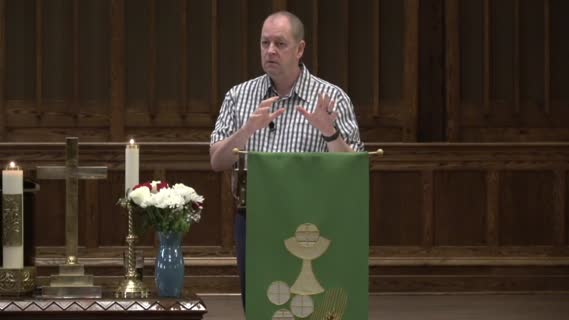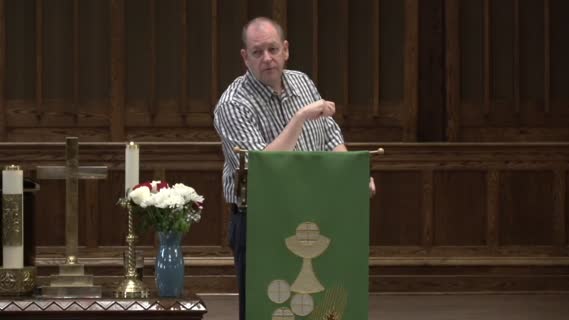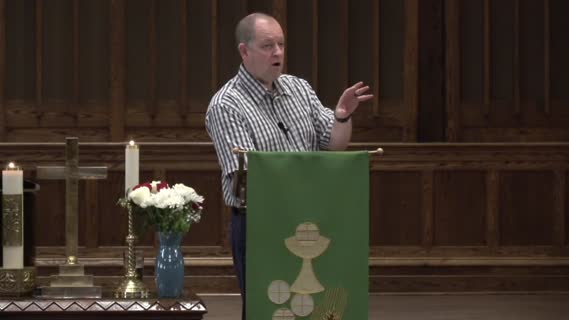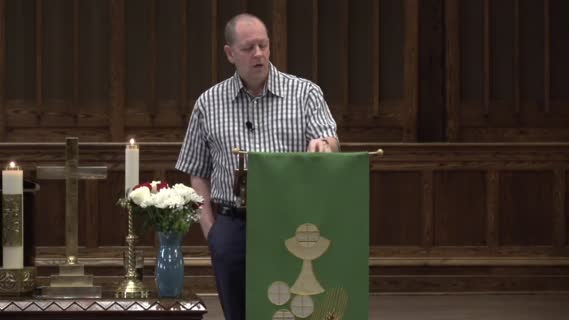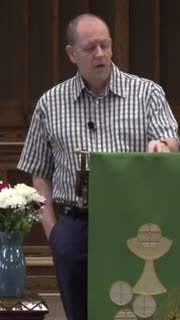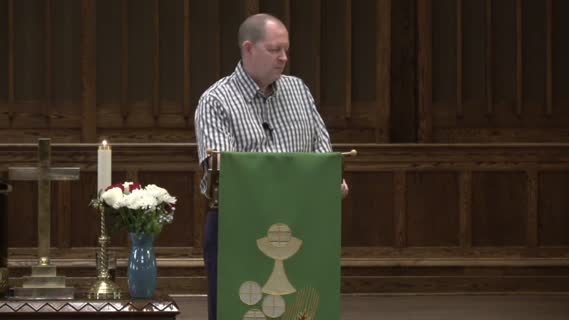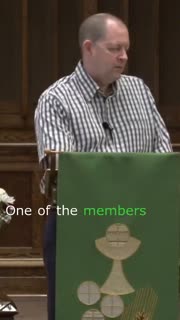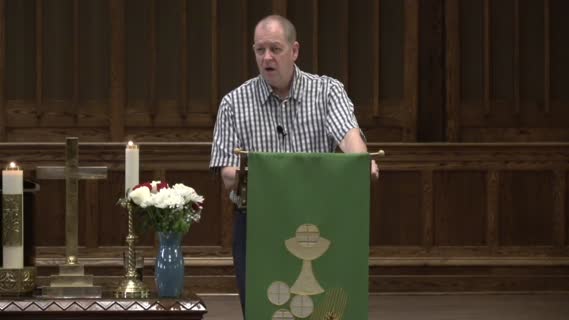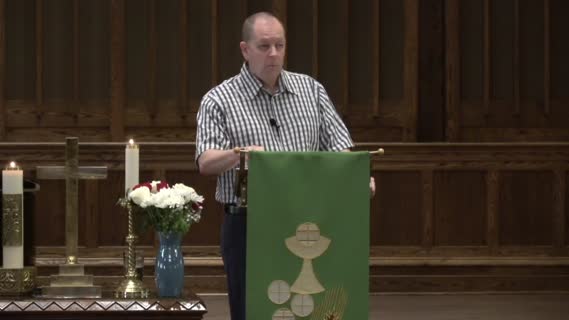Confronting Marriage and Morality in Today's Church
Devotional
Sermon Summary
Bible Study Guide
Sermon Clips
### Quotes for Outreach
1. "Let's create some space where we can recognize that we are all human and that we are that mistakes are a reality of who we are that's essential to our theology so it's important to step in with some humility into this conversation that we can always find exceptions but the but the underlying argument is still there the strong marriage is essential to a strong family and from there the correlation to strong communities and neighborhoods is pretty is pretty there it's pretty strong." [08:19]
2. "Being a father and a husband is the most demanding challenging frustrating and amazing thing you can ever do in life this idea somehow that happiness is only associated with just the hedonistic values that paul's responding to or this excessive self-centeredness there's an emptiness in that that is so profound and that for those of you who are parents and grandparents i mean it." [11:43]
3. "A strong marriage is one in which the the the two people involved in that marriage can literally lean on each other and when that when it's when their own personal lives may be faltering and and it's that's that's a strong marriage you can just save the other person what you're really talking about here is is just being present being loving being committed being self-giving towards your spouse." [16:39]
4. "Strong marriages result in strong healthy vibrant children who in turn grow on grow up to do wonderful things and when they do that the rest of the community the rest of the neighborhood the rest of the world also grows stronger." [18:36]
### Quotes for Members
1. "One of the members of that committee, one day, I'll never forget this, he said to me, I want you to promise something to me. The finger was really pointed. I want you to promise something to me, that you'll never be like all those ministers that never talks about the tough stuff. You're not going to be like these ministers that never really says what they believe. I want you to promise me that. And he did. That was his voice. He was, I think it was ex-army, too. That explained a lot. I said, oh, I promise. I promise. And I've kept that promise, all these years later." [01:29]
2. "Well, marriage has been extremely divisive issue over the last 60 years. And I guess the third I would, would, would offer would be abortion, would be a third issue that has been extremely divisive in the last 60 years. And so we have two of the three issues that are, are, are the most divisive. pronounced in terms of creating conflict both within churches within denominations and and ecumenically and yet the the structure by which we approach preaching doesn't even bring a lot of these core texts to the surface to be talked about so i think we have to talk about these questions and my goodness there have been such egregious and pathetic use of scripture around the issues particularly of sexual morality but marriage i mean i i've had situations where i've had congregants standing and yelling things and leaving you know around issues of of god loving all people well apparently not for some folks." [03:00]
3. "I think we became so selfish about marriages that it is drastic impact it has had horrible impacts in so many different ways in our society and the anti the anti-marriage movement also now has an anti-children movement you know you can be so much happier apparently if you don't have kids i would challenge that obviously you know being a father and a husband is the most demanding challenging frustrating and amazing thing you can ever do in life this idea somehow that happiness is only associated with just the hedonistic values that paul's responding to or this excessive self-centeredness there's an emptiness in that that is so profound and that for those of you who are parents and grandparents i mean it." [11:43]
4. "Paul offers this incredibly hopeful idea he says look hold on to that within the within the institution of marriage hold on to the idea that there's there's going to be differences and you got to navigate and work your way through those and the marriage is the best institution of marriage and the best institution of marriage and the best institution of marriage is the best institution to try and make that work but it doesn't always so we have to sit here and it's important for me to state to state this very categorically that i am not offering a a judgmental condemnation of those whose marriage dissolves or breaks down i've worked with lots of couples over the year years you know so far i was thinking back all the marriages and counseling you know i i can't think of any any that have collapsed yet that i'm aware of certainly i know within a lot of my friends and the marriages have dissolved and collapsed for a whole host of reasons and there have even been times where in a counseling situation i don't profess to be a marriage counselor but i've certainly suggested that in certain circumstances particularly where abuse is is prevalent that that marriage needs to dissolve it is toxic and unhealthy and not the grounds for a strong family so we have to step into this with profound sense of compassion for how difficult it is to hold a marriage together." [14:59]
5. "Paul what paul is really saying is that for that society in that time making a commitment to a marriage was in the spent was essential in building not only strong families a place for children to to grow into and to be nurtured and loved and supported but also to hold that society together which at that time was really very splintered and headed in a wrong way that's what i think paul's doing and i think that message is still important today it's still an institution of marriage it's still worth us celebrating and i believe it is worth us pushing back against those who somehow seem to think that it's it's an old archaic idea no strong marriages result in strong healthy vibrant children who in turn grow on grow up to do wonderful things and when they do that the rest of the community the rest of the neighborhood the rest of the world also grows stronger." [18:36]
Ask a question about this sermon
1. "Let's create some space where we can recognize that we are all human and that we are that mistakes are a reality of who we are that's essential to our theology so it's important to step in with some humility into this conversation that we can always find exceptions but the but the underlying argument is still there the strong marriage is essential to a strong family and from there the correlation to strong communities and neighborhoods is pretty is pretty there it's pretty strong." [08:19]
2. "Being a father and a husband is the most demanding challenging frustrating and amazing thing you can ever do in life this idea somehow that happiness is only associated with just the hedonistic values that paul's responding to or this excessive self-centeredness there's an emptiness in that that is so profound and that for those of you who are parents and grandparents i mean it." [11:43]
3. "A strong marriage is one in which the the the two people involved in that marriage can literally lean on each other and when that when it's when their own personal lives may be faltering and and it's that's that's a strong marriage you can just save the other person what you're really talking about here is is just being present being loving being committed being self-giving towards your spouse." [16:39]
4. "Strong marriages result in strong healthy vibrant children who in turn grow on grow up to do wonderful things and when they do that the rest of the community the rest of the neighborhood the rest of the world also grows stronger." [18:36]
### Quotes for Members
1. "One of the members of that committee, one day, I'll never forget this, he said to me, I want you to promise something to me. The finger was really pointed. I want you to promise something to me, that you'll never be like all those ministers that never talks about the tough stuff. You're not going to be like these ministers that never really says what they believe. I want you to promise me that. And he did. That was his voice. He was, I think it was ex-army, too. That explained a lot. I said, oh, I promise. I promise. And I've kept that promise, all these years later." [01:29]
2. "Well, marriage has been extremely divisive issue over the last 60 years. And I guess the third I would, would, would offer would be abortion, would be a third issue that has been extremely divisive in the last 60 years. And so we have two of the three issues that are, are, are the most divisive. pronounced in terms of creating conflict both within churches within denominations and and ecumenically and yet the the structure by which we approach preaching doesn't even bring a lot of these core texts to the surface to be talked about so i think we have to talk about these questions and my goodness there have been such egregious and pathetic use of scripture around the issues particularly of sexual morality but marriage i mean i i've had situations where i've had congregants standing and yelling things and leaving you know around issues of of god loving all people well apparently not for some folks." [03:00]
3. "I think we became so selfish about marriages that it is drastic impact it has had horrible impacts in so many different ways in our society and the anti the anti-marriage movement also now has an anti-children movement you know you can be so much happier apparently if you don't have kids i would challenge that obviously you know being a father and a husband is the most demanding challenging frustrating and amazing thing you can ever do in life this idea somehow that happiness is only associated with just the hedonistic values that paul's responding to or this excessive self-centeredness there's an emptiness in that that is so profound and that for those of you who are parents and grandparents i mean it." [11:43]
4. "Paul offers this incredibly hopeful idea he says look hold on to that within the within the institution of marriage hold on to the idea that there's there's going to be differences and you got to navigate and work your way through those and the marriage is the best institution of marriage and the best institution of marriage and the best institution of marriage is the best institution to try and make that work but it doesn't always so we have to sit here and it's important for me to state to state this very categorically that i am not offering a a judgmental condemnation of those whose marriage dissolves or breaks down i've worked with lots of couples over the year years you know so far i was thinking back all the marriages and counseling you know i i can't think of any any that have collapsed yet that i'm aware of certainly i know within a lot of my friends and the marriages have dissolved and collapsed for a whole host of reasons and there have even been times where in a counseling situation i don't profess to be a marriage counselor but i've certainly suggested that in certain circumstances particularly where abuse is is prevalent that that marriage needs to dissolve it is toxic and unhealthy and not the grounds for a strong family so we have to step into this with profound sense of compassion for how difficult it is to hold a marriage together." [14:59]
5. "Paul what paul is really saying is that for that society in that time making a commitment to a marriage was in the spent was essential in building not only strong families a place for children to to grow into and to be nurtured and loved and supported but also to hold that society together which at that time was really very splintered and headed in a wrong way that's what i think paul's doing and i think that message is still important today it's still an institution of marriage it's still worth us celebrating and i believe it is worth us pushing back against those who somehow seem to think that it's it's an old archaic idea no strong marriages result in strong healthy vibrant children who in turn grow on grow up to do wonderful things and when they do that the rest of the community the rest of the neighborhood the rest of the world also grows stronger." [18:36]
